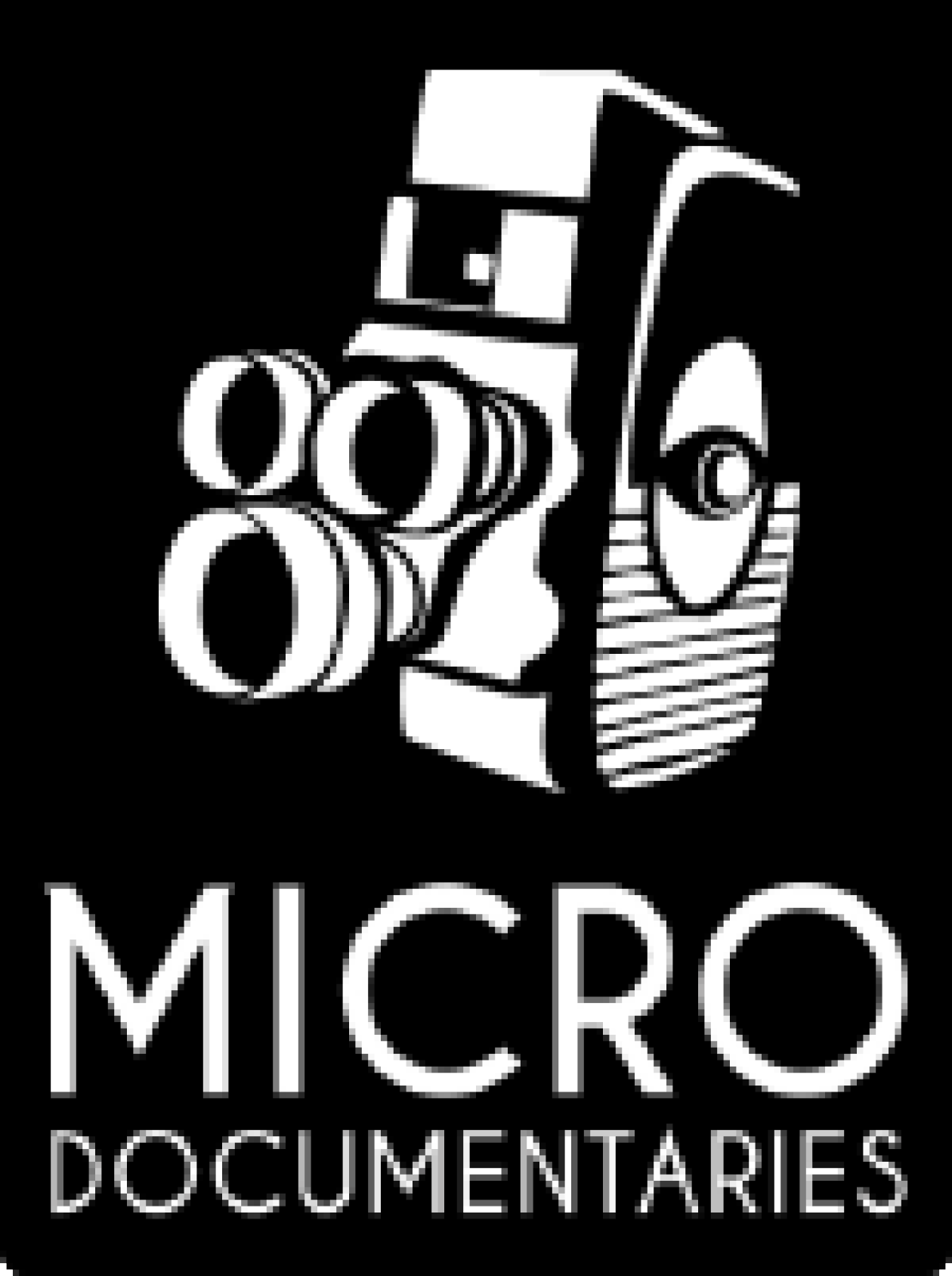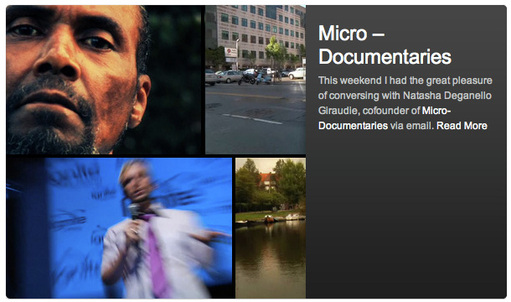From the VonCreedy Blog
This weekend I had the great pleasure of conversing with Natasha Deganello Giraudie, cofounder of Micro-Documentaries via email. The following is our Q and A. I hope you will find it as inspiring as I do.
Josh Mormann | von Creedy: I was immediately intrigued when I saw the Micro-Documentaries logo with your testimonial on PipeJump.com the other day. Upon looking through your website I was impressed with everything I learned about the company, from the genuine and passionate mission, to the clear explanation of your process, the friendly biographic team introductions, to the outstanding quality of the work you do.
Natasha Deganello Giraudie | Micro-Documentaries: That’s pretty funny about Pipejump. I really like their product, and was happy to give them a testimonial. Now that is resulting in our very first formal interview! Don’t you love how the world works?
Thank you for contacting us. We appreciate your interest and your enthusiasm for our work.
vonC: Micro-Documentaries must have been born from your unconcealed love of filmmaking and profound enthusiasm for positive social change. When did you discover filmmaking, and what inspired you to pursue the craft as your deliberate course of action for making a difference?
Natasha: Photography, filmmaking and social change were naturally woven into my life. My father loved photography and would enjoy it as a hobby. He had a dark room at home when I was growing up. I still remember the smell while we were printing the images, the red light that let us see what we were doing and our favorite pictures on the wall. My parents were also quite adventurous and on holidays we would go on long expeditions to discover the pristine beauties of Venezuela, where I grew up, from the Caribbean to the Amazon. We also had several Ansel Adams books, which I loved reading. His trips to Yosemite, reminded me of our adventures. With the appreciation for so much natural beauty, also came deep gratitude for our ancestors for having protected it for us and an urgency for us to do the same for our grandchildren.
Right out of college I had an amazing opportunity of contributing on a small film crew which focused on producing documentaries of Venezuela’s natural treasures in a way that would inspire environmental consciousness and action. I remember thinking that it was my dream job. I loved working in the rustic environment on location and the creative energy, but nothing compared to the great satisfaction of working on behalf of a land that I loved so much. Later on, I had the opportunity of focusing the camera on other things that were dear to my heart like children’s issues in Nepal and later on Tibetan Buddhism in Bhutan. Each time it has been a privilege.
vonC: Each of you have been doing significant work with non profit, and other philanthropic organizations in various capacities to help others. Unfortunately this is an uncommon aspect of human character these days. Have you always had a desire to give back? Can you tell us a little about the organizations that you have been involved with outside of Micro-Documentaries?
Natasha: I don’t feel it is an uncommon aspect of human character these days. I am constantly inspired by people in many places of the world committing great energy to improving our human experience. It’s natural. Once you feel the joy of working for the benefit of others, you can’t get enough of it. As much as I love chocolate, there comes a point where I would get an indigestion if I ate too much. That doesn’t happen when you do this sort of work. It just gets better and better – which, of course, is a mark of what brings true happiness.
vonC: I’m going to have to assume, based on what I’ve gleaned from the People page of your website, that much of your team met back at Stanford University. How did you meet, and how did Micro-Documentaries come together?
Natasha: We actually didn’t meet at Stanford, although we are definitely are tied by the fulfilling experience the school brought to both Ben and I. Several of us worked together at Papilia and Current TV, but Ben and I came together through a common friend. I had just returned from a sabbatical ready to start a new job running a wonderful organization. The day before I accepted the offer, I met Ben. He had been doing documentary-style film work with Stanford to support their fundraising efforts. The pieces were beautiful and powerful. It didn’t take long to understand their transformative potential. I thought of all the nonprofits I had worked with at Papilia and I knew they could all use this type of support in their humanitarian, environmental and philanthropic efforts.
In addition to his cinematographic talent, I appreciated Ben’s bright outlook, common sense and, most of all, his determination to apply his skills for social and environmental good. I had a strong intuitive sense that I wanted to partner with him in this pursuit. After experimenting a bit, we founded Micro-Documentaries in November 2009.
vonC: I think what I love most about your company, is the fact that you filter your clients based on their contribution to the world, and the authenticity of their message. With many small service businesses it is common, and tempting to start by following the money with the hope to be pickier about clients down the road. However that approach can lead to all kinds of unexpected and less desirable outcomes. It is obvious from your work, that you have filtered your clients by message and contribution from the very beginning rather than just cash, because all of your work is honest, and truly compelling, and valuable. Tell me about this. How did you decide to be choosy from the beginning? and what are your biggest challenges as a result?
Natasha: Life is so short – so for us, it’s simply a matter of asking ourselves how to make best use of that precious time. There are so many micro-documentaries to be made. So many inspiring stories to be told. So many problems to resolve. So many kids counting on us to pass on the best possible world we can create.
Any business can be a powerful vehicle for social change. Improving the world is in the interest of 6 billion people – that’s a big market. The opportunities are endless.
Our challenges right now are the ones we’re happy to have. We are going through growing pains, and couldn’t be more grateful.
vonC: About how many micro-documentaries would you say that you produce a year? And how long does it take to produce one from that first phone call to finished product?
Natasha: We are currently producing a few dozen micro-documentaries per month. From the day of production to finished product, usually takes 3-6 weeks. From the first phone call to production depends on how fast the client is ready to move.
vonC: As filmmakers, do you practice your craft outside of your work itself at all? or would you say that doing the work is your practice?
Natasha: You could say that our work is our practice, although everyone at Micro-Documentaries has interesting projects going on outside the company. Projects like sewing wedding dresses, photographing the ocean, writing cooking blogs, volunteering, teaching meditation, raising toddlers. We’ve made a great effort to honor this at Micro-Documentaries and to provide ample space and flexibility for these other aspects of our lives. It’s good for all of us, which in turn makes it good for the business. We’d love for this to be a company that energizes people. Unfortunately, we see too many examples of companies draining their people. I don’t think it’s intentional, but it has become the norm, so guarding ourselves from this tendency has to be a conscious effort.
vonC: And how about continued inspiration, what resources do each of you use to stay inspired?
Natasha: Our clients keep us inspired. It’s not unusual for us to be moved to tears when learning about their work and the impact they are having in our world. It gives us such great hope. We are thrilled to be part of it.
vonC: For many people doing creative work, one of their biggest challenges can be in just staying motivated. Do either of you ever have trouble with motivation? if not, why do you think that is? if so, what do you do to get past those times?
Natasha: An endless source of motivation is working for the common good. If someone is not getting that satisfaction directly from their work, they could always look for ways to volunteer their talents, which is likely to recharge their batteries. Generally though, I would encourage people to try to find this type of motivation in their work – because that’s where we spend so much of our lives.
vonC: I don’t think anyone can read through your website without being inspired to give back to the world in some capacity, and be a part of positive change. What advice do you have for people who would like to contribute their time and or resources in some way, but don’t know where to begin?
Natasha: I think most people know where to begin. We just have to wake up in the morning and pay attention to the opportunities that life gives us to make a little difference. A piece of trash on the sidewalk we could throw away, a smile we could give, a door we could hold open, a deep breath we could take when anger starts to grow – you don’t really have to look that far.
But recently, Tom Siebel has been a profound source of inspiration in this regard with the Montana Meth project. (See article describing it as catalytic philanthropy.) It’s quite amazing. He took his great skill, talent and experience and focused it on a tragic problem with highly impressive results. Imagine what we could accomplish by replicating this approach.
vonC: Well, thanks so much again Natasha, for taking the time to answer some questions. I think the work you are doing truly great, and inspiring, and I wish you continued success in all that you do.
Natasha: It’s been our pleasure. Thank you very much, Joshua, for taking such thoughtful time to share the stories of so many interesting people with all of us. We appreciate it.

